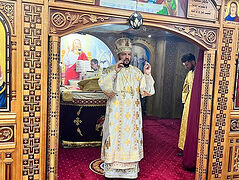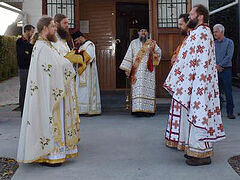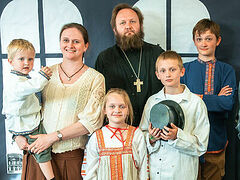Most of us know that there is such a country as Madagascar exclusively based on the world map and a popular cartoon. Few, even among the most “advanced” Orthodox folks, are aware that there is an Orthodox mission there accounting to twenty priests and a deacon. Archpriest Vladimir Boikov, the dean of the Russian churches in New Zealand, learned by sheer chance that their mission lacked vestments, and with the blessing of a local bishop, put the word out in his diocese. The response came quickly…
 —Fr. Vladimir, is it true you learned about the Russian Orthodox mission on Madagascar from Internet? What do you know about it?
—Fr. Vladimir, is it true you learned about the Russian Orthodox mission on Madagascar from Internet? What do you know about it?
—That’s right, on the Internet! About ten years ago, I met Fr. Andrey Novikov, the rector of the Holy Trinity Church on Vorobyovy Gory (Sparrow Hills) in Moscow, and Fr. Georgiy Maximov. Fr. Andrey and I occasionally exchange messages on social media and I follow what they do in their ministry in Africa. Not too long ago, I came across Fr. Andrey's post about his ministry in Madagascar. He conducted a pastoral seminar in Antananarivo for all the country’s priests and a deacon. They made a general picture where everyone was wearing their crosses, but three priests weren’t dressed in cassocks.
At the time, I was thinking: what’s wrong, why aren’t these priests dressed in cassocks? Then I did some reading about Madagascar and found out that it was the poorest country in Africa.
All of this happened on May 14, but two days later, our dear Metropolitan Hilarion (Kapral), First Hierarch of the Russian Orthodox Church Abroad, reposed in the Lord. He truly loved missionary work, and thinking of him, I decided that it would be really nice to offer assistance in memory of our Vladyka, so that they would pray for him.
I wondered: there are a lot of vestments and holy vessels no longer used, but still in decent condition lying around in the sacristies of our parishes. But over there, they have twenty priests and a deacon who we can serve by passing on the things they need. I wrote Fr. Andrey that there was such an idea, and he in turn received the blessing from Metropolitan Leonid, the Patriarchal Exarch. So, with God's help, we got down to work.
I did not think about the logistics at all, since my knowledge about Madagascar was based on a caricature. So, I simply asked for the ruling hierarch’s blessing to carry out this campaign: to ask all the parishes in the Australian and New Zealand Diocese to collect usable items and send them over to Madagascar through our Church of Resurrection in Auckland (New Zealand).
I carried all of this out of Australia in my own suitcases. I have already been there a few times since May, and every time I went back, I’d buy additional baggage. This way, every time I was bringing back about sixty kilos of stuff for Madagascar. We were sorting them out in our parish and already dispatched two shipments weighing ninety-eight and seventy-seven kilos. Thank God, everything was in a very good condition, and the only thing we had to leave behind was a small cover for the altar table, since it was torn.
Both loads had reached their destination and the local priests have already opened it and begun using those vestments.
I plan to send a third shipment in mid-November, because I still have about one hundred and twenty kilos of vestments and even a few more church vessels left in Australia. I will need to go there two or three more times to pick it all up.
A significant portion of the shipping costs was at the account of our parish’s charitable foundation. I borrowed this idea from St. John the Baptist Cathedral in Washington, DC, where I served in the early 2000s. The parishioners there were raising money for such a fund, so I thought: it is a great idea! I asked the rector, Fr. Victor Potapov: how do they use these funds? He said: to help those in need.
When I arrived in New Zealand I told my parishioners that we should also have such a fund. We may not have too much to start with, but we will also raise money for the needy. So, it really helped us this time around.
—What kinds of things did you send to Madagascar?
—First of all, the liturgical vestments. We sent about 30-40 vestments for priests, deacons, altar servers, antimensions and analogion and chalice covers, and altar curtains. Most of them were handmade by our parishioners between the 1950s and the 1980s, when there was neither a factory in Sofrino, nor any other similar enterprise in Russia that produced such items. A few things were sent by my parish in Australia where I grew up and I remember them quite well. They are mostly old, used items, but in excellent condition and can be used right away.
There was just one thing I was slightly worried about. Most of the priests in Madagascar are short in height, so these vestments could end up being too big for them. I even suggested that the priests could do alterations and make them shorter, if necessary. But they sent me photos as proof showing that everything was just right.
—What response did you get from Madagascar?
Politics isn’t a part of my pastoral ministry, but helping your neighbor is the law of the Scriptures
—The fathers were happy. Especially since, due to the current political situation, they no longer are able to receive large shipments from Russia. Politics isn’t a part of my pastoral ministry, but helping your neighbor is the law of the Scriptures. I just wanted to support those in need. Had I known before, I would have sent aid to Madagascar sooner.
—What was the reaction of your parishioners in New Zealand?
—They were happy, too. The whole idea of setting up a charitable foundation in our parish was to collectively support those in need. And of course, people were happy to hear about such humanitarian aid. We live a rather isolated life here in New Zealand, far removed from our diocesan center located in Australia. Parish life here was never easy from the very onset, in the 1950s. Even now, when, for the last thirty years, we have new people coming from all over the former Soviet Union, our parishioners understand how difficult it is to keep the Orthodox faith alive in such, albeit relative, isolation. After all, it’s not very easy to even get to Australia and see other Orthodox Christians. So, they were happy to offer help to twenty priests and a deacon in Madagascar, so that they could carry on with their Orthodox mission.
—Did you get a sense how the Russian Orthodoxy in Africa is different from the Orthodoxy all of us tend to know, and how are they alike?
—At this point, I spoke only with two priests from Madagascar, so I didn’t yet get the feel of it. By all means, I would love to visit them, I enjoy traveling plus I really like the idea of doing the missionary work. I set my sights to go there and find out what it’s like to be an Orthodox there. Meanwhile, I only learned about it via the Internet and the messages I received from the local priests. Currently, their dean, Fr. Nicholas, asked my help in getting the local children ready for the new school year. I thought that instead of sending any school supplies, we’d better send them money, so they can buy all the necessities themselves.
—To what extent is it important for the Russian Orthodox Church to maintain its presence in Africa in general and in Madagascar in particular?
—It is very important to help in spreading the Word of God. If we look below the surface, this is what the missionary work is about: taking the Word of God and trying to spread it throughout the world. There is such need on Madagascar, so we decided we needed to work like good Samaritans, to learn about our brothers’ needs and serve them. It turns out that people from one little corner of the world are sending some assistance to another little corner of the world. We will certainly try to do it in the future. Yours truly only accepts and passes on what our diocese has collected, and I thank our priests and parishioners who put in their best effort to do it. I sent a full list of our priests to Fr. Nicholas, the dean on Madagascar, so they could pray for them. He sent me the names of their priests and a deacon. We will share a brotherly prayer for one another. It is so hard for us to be Orthodox Christians here, at the end of the world. It is difficult for them on Madagascar as well. Sure, we don’t share the same difficulties, but we must strive to overcome them and stand together.
—You have served in Australia, visited China, and you are currently serving in New Zealand. From an Orthodox point of view, all these countries are exotic. How do you feel when you literally bring the Word of God to the indigenous people, who perhaps have never heard it? Do you get anything in response?
—It is too early in our history to talk about some large-scale mission specifically related to our Aborigines. Basically, I interacted with only one priest in our Church from among the Aborigines named Fr. Seraphim, God rest his soul! We often talked with him about the need to reach out to the Maori, the native New Zealanders, as well. He was doing it on a small scale in Australia; there are quite a few New Zealanders there.
 Archpriest Vladimir Boikov Of course, Vladyka Hilarion (Kapral) was involved in this; he loved to open new parishes and English-speaking missions in our diocese. In New Zealand, we try to serve the needs of those indigenous people who come to us. For example, during the pandemic we had about ten or fifteen people who were interested in Orthodoxy. It may seem like a drop in the ocean to some, but it is quite a lot for us. We are in the process of baptizing them when they are ready—they are predominantly young and older men who are seeking spirituality and found the Orthodox Church through our Russian parish.
Archpriest Vladimir Boikov Of course, Vladyka Hilarion (Kapral) was involved in this; he loved to open new parishes and English-speaking missions in our diocese. In New Zealand, we try to serve the needs of those indigenous people who come to us. For example, during the pandemic we had about ten or fifteen people who were interested in Orthodoxy. It may seem like a drop in the ocean to some, but it is quite a lot for us. We are in the process of baptizing them when they are ready—they are predominantly young and older men who are seeking spirituality and found the Orthodox Church through our Russian parish.
First and foremost, our mission is directed to our people—the ones who left China in the 1950s and 1960s, in the 1980s, and those who arrived from the former Soviet Union beginning in the 1990s. Naturally, we don't have a lot of resources, but we are trying to serve both the Russians and the locals. For example, after the pandemic ended, we started having two Vespers on Saturdays in our church instead of having a single All-Night Vigil: one is in Church Slavonic and another in English, since we’ve had an influx of new English-speaking parishioners. They are all very devout people and participate in the services. During the Dormition fast we chant antiphonally the Paraklesis to the Mother of God in both languages every evening. Essentially half of our worshipers are English-speaking and the other half speaks Russian.






